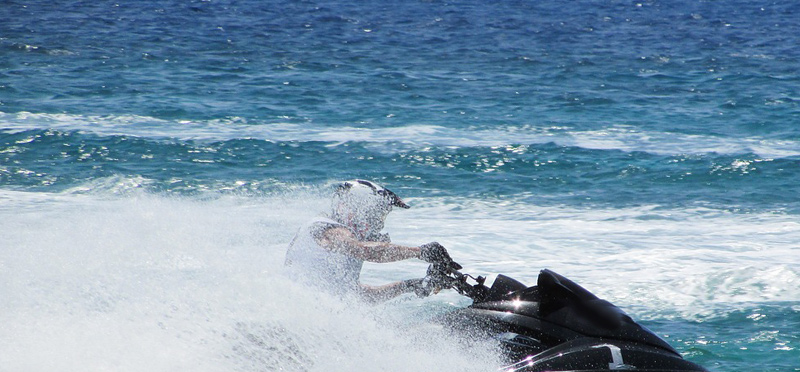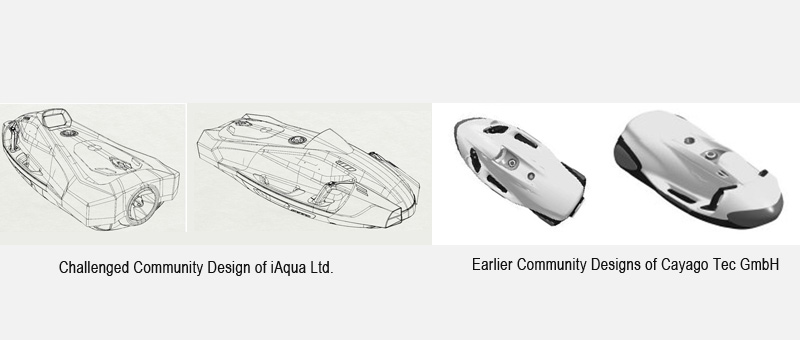Scooter case-law CFI: designer's freedom of design

If invalidity proceedings concern a design registered as a Community design that possibly imitates an earlier design, the designer's freedom of design is relevant in addition to the overall impression.
This is also the case in the current decision made by the European Court (CFI) on 6 September 2023 on a registered design of a water scooter. Interesting in this decision on invalidity proceedings is the interpretation of the designer's freedom of design.
Designer's freedom of design
The designer's freedom of design can be interpreted ambivalently. This is because, according to case law, the degree of the designer's freedom of design is a factor that may underpin or, on the contrary, nuance the conclusion as to the overall impression produced on the informed user (see CFI judgment of 6 June 2019, Motor Vehicles, T 209/18).
On the one hand, it can be argued that with a wide degree of freedom of design, an informed user would overlook small differences. If in high freedom of design two designs are quite similar and without clear differences, they would create the same overall impression on a user.
This is also the principle in case law, called the inverse proportionality rule. Accordingly, the greater the designer's freedom of design in developing the design, the less sufficient are small differences between the opposing designs to create a different overall impression on the informed user (see CFI Judgment of 13 June 2019, Information boards for vehicles, T 74/18).
On the other hand, the designer's freedom of design may be a factor which makes it possible to nuance the assessment of the individual character of the contested design and not an independent factor. Such an interpretation is particularly supported if the design is subject to constraints imposed by technical functions of components. Such constraints lead, according to case law, to the standardisation of certain features which are then common to the designs (see judgment of the CFI of 23 October 2003 in Case T-193/20, Eternit/).
So how did the CFI rule on this question in its recent water scooter decision?
The parties
The parties to the dispute over the water scooter design are the owner of the earlier Community design, Cayago Tec GmbH (Germany), and the owner of the later registered design, iAqua (Shenzhen) Ltd, (China). Cayago Tec GmbH filed an application for invalidity in 2019 against the July 2019 registered Community design of a water scooter, with reference to its own earlier protected designs.
In support of its action, Cayago Tec referred to the litigation between it and iAqua Ltd. in Germany, Spain and France, as well as to the EUIPO decision of 22 November 2006 (Case R 196/2006-3) between the two parties to the dispute.
The marketing of the Chinese intervener's goods in Germany had also been provisionally prohibited in the context of proceedings for interim relief.
In addition, iAqua's goods were preventively seized at the boat shows in Cannes (France) in September 2019 and in Barcelona in October 2019. According to the German complainant, this confirms the existence of infringements by iAqua.
Overall impression: how similar are the water scooter designs?
The European Court found - as did the EUIPO Board of Appeal - a wide degree of freedom of design and that the main difference between the designs in question was in their front part (the later design with an angled nose with two lateral nozzles, the older design a smooth, rounded nose). According to CFI, this gave the challenged later Community design a more sporty appearance. The court also mentioned some other differences, such as the design of the support area for the torso and the lines of the rear part.

Contrary to what the German complainant maintains, these are not incidental details which do not give the contested design an overall impression dissimilar to that produced by the earlier designs. Rather, they were essential differences which outweighed the overlapping elements of the designs in question, especially as some of those differences affected not only the appearance of the goods but also their comfort. An informed user would notice this and therefore perceive a different overall impression from that produced by the earlier Community design.
Proceedings before the national courts and expert opinion
The remaining arguments of Cayago Tec GmbH were rejected by the CFI.
Proceedings before the national courts have no binding effect on the EUIPO (see inter alia judgment of 9 February 2017, Gobelets, T-16/16). Therefore, they cannot call into question the Board of Appeal's assessment in the contested decision and, in any case, cannot affect its legality.
Similarly, the submission of an expert opinion confirming the overall impression of similarity of the designs in question water scooters was not successful. It is true that expert opinions may be introduced and used as evidence (under Article 65(1)(e) of Regulation No 6/2002). But, according to the case law, it is not for an expert to make legal assessments, in particular on the individual character of the contested design. This also applies, the CFI stated, even though the expert opinion contains findings that are not legally invalid.
And the EUIPO decision between the parties of 8 August 2022 (Case R 952/2021-3), could not be relied on either, the CFI explained. This was because the EUIPO had, with this decision, suspended the handling of this case precisely until the court's decision ending the litigation in the present case.
The action brought by Cayago Tec GmbH was therefore dismissed in its entirety (CFI, 6 September 2023, T 377/22).
This recent decision shows once again how important good argumentation is in design proceedings. Our patent law firm is very experienced in this field. We will be happy to advise and represent you in such a case and in all other questions concerning design protection.
Please contact us, an enquiry is free of charge and without any obligation: by phone at +49 69 69 59 60-0 or info@kollner.eu.







